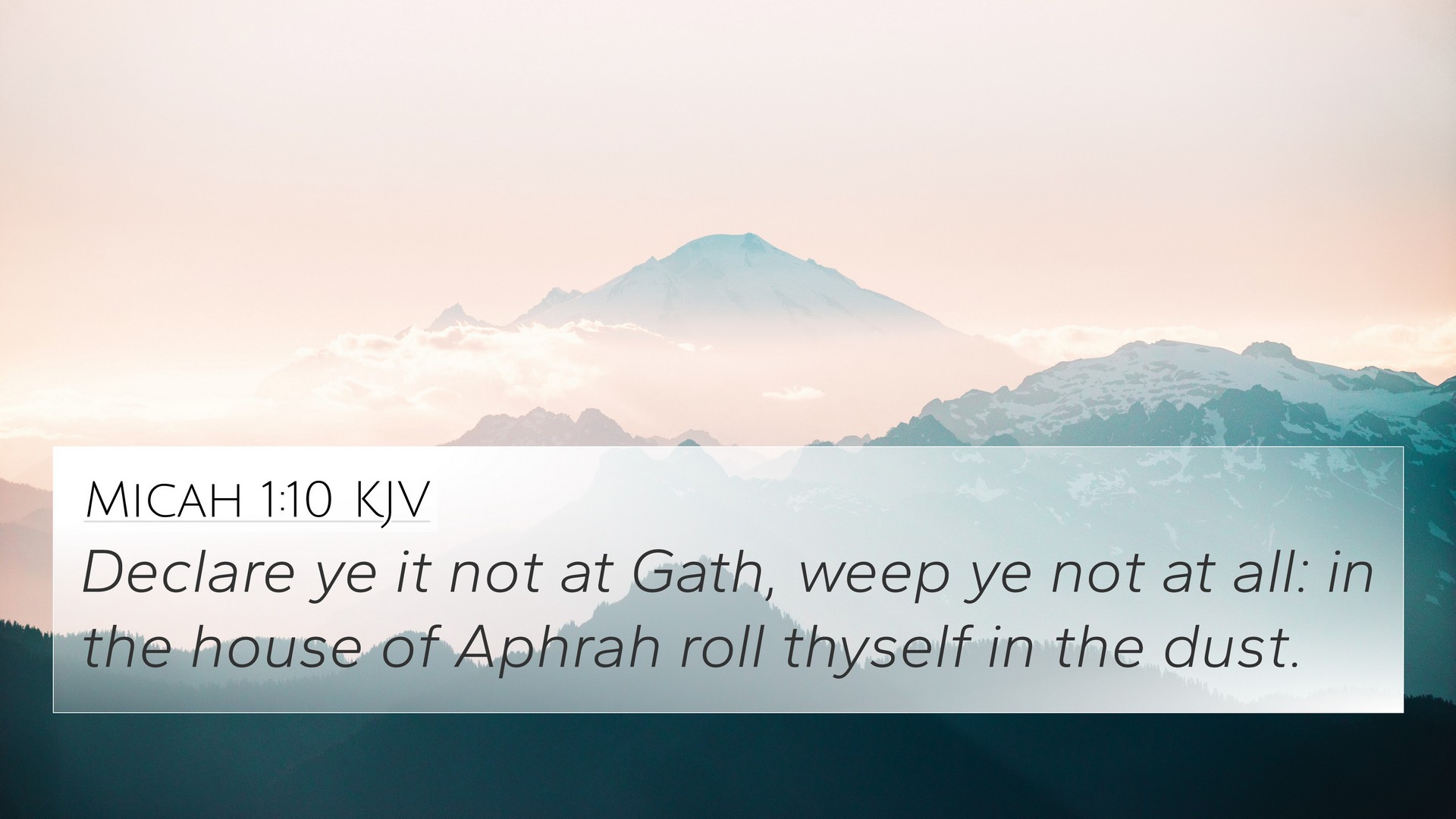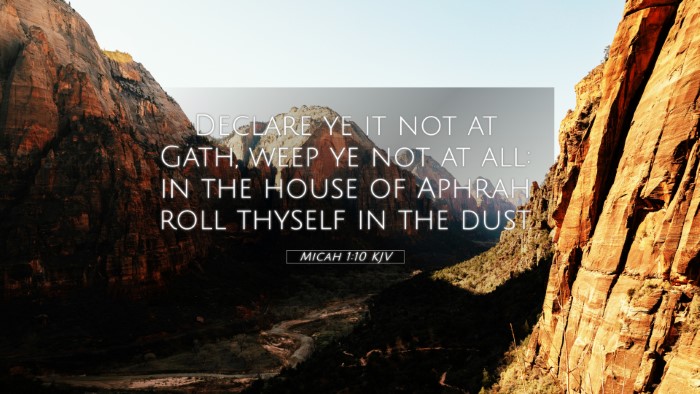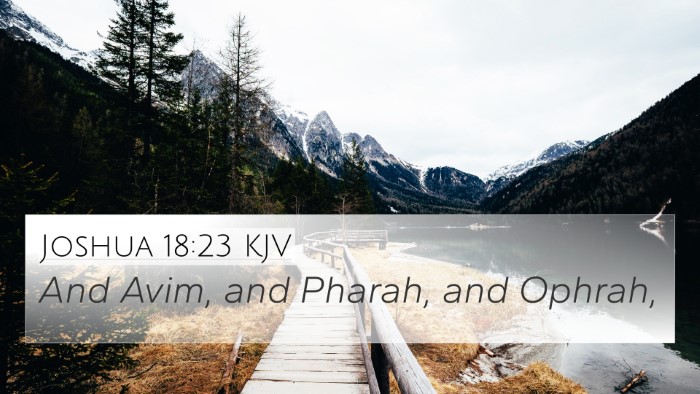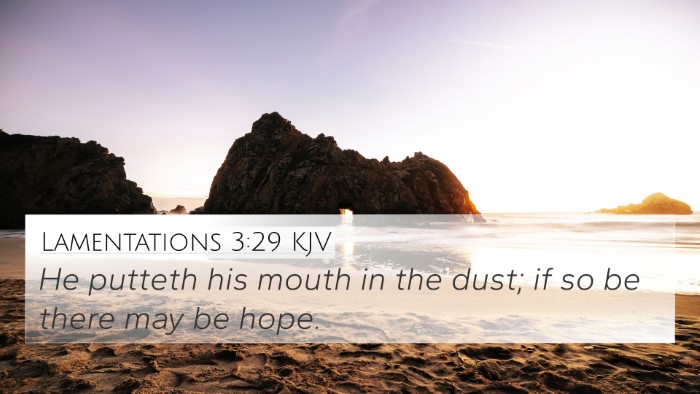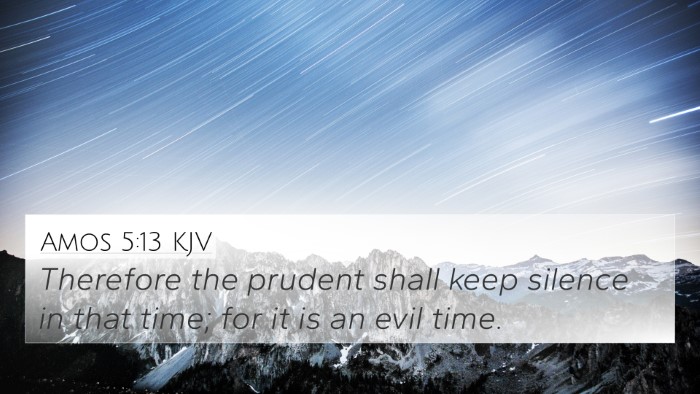Old Testament
Genesis Exodus Leviticus Numbers Deuteronomy Joshua Judges Ruth 1 Samuel 2 Samuel 1 Kings 2 Kings 1 Chronicles 2 Chronicles Ezra Nehemiah Esther Job Psalms Proverbs Ecclesiastes Song of Solomon Isaiah Jeremiah Lamentations Ezekiel Daniel Hosea Joel Amos Obadiah Jonah Micah Nahum Habakkuk Zephaniah Haggai Zechariah MalachiMicah 1:10 Similar Verses
Micah 1:10 Cross References
Declare ye it not at Gath, weep ye not at all: in the house of Aphrah roll thyself in the dust.
Uncover the Rich Themes and Topics of This Bible Verse
Listed below are the Bible themes associated with Micah 1:10. We invite you to explore each theme to gain deeper insights into the Scriptures.
Micah 1:10 Cross Reference Verses
This section features a detailed cross-reference designed to enrich your understanding of the Scriptures. Below, you will find carefully selected verses that echo the themes and teachings related to Micah 1:10 KJV. Click on any image to explore detailed analyses of related Bible verses and uncover deeper theological insights.
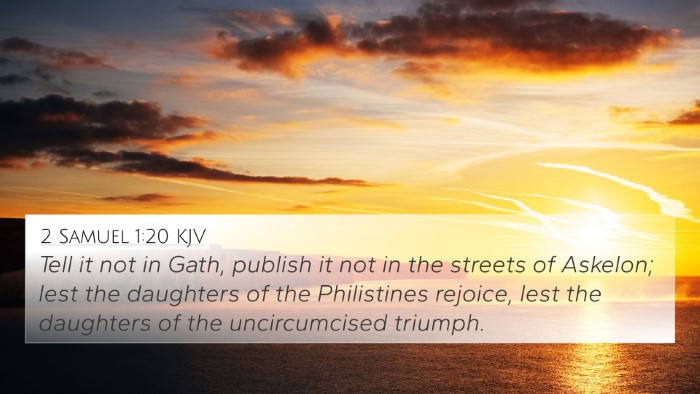
2 Samuel 1:20 (KJV) »
Tell it not in Gath, publish it not in the streets of Askelon; lest the daughters of the Philistines rejoice, lest the daughters of the uncircumcised triumph.
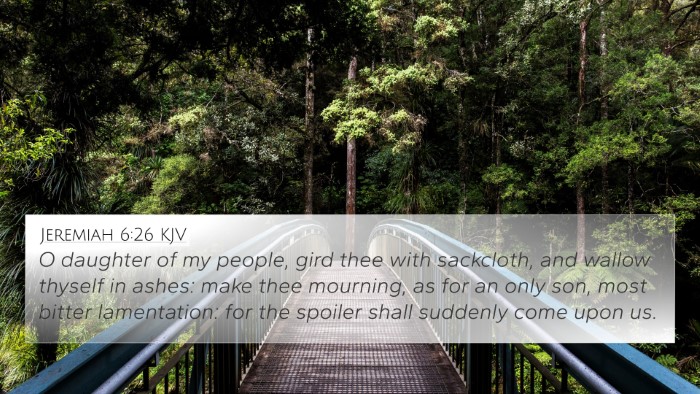
Jeremiah 6:26 (KJV) »
O daughter of my people, gird thee with sackcloth, and wallow thyself in ashes: make thee mourning, as for an only son, most bitter lamentation: for the spoiler shall suddenly come upon us.
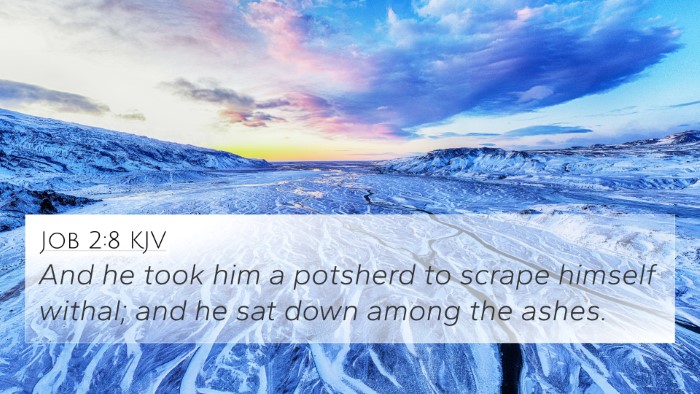
Job 2:8 (KJV) »
And he took him a potsherd to scrape himself withal; and he sat down among the ashes.
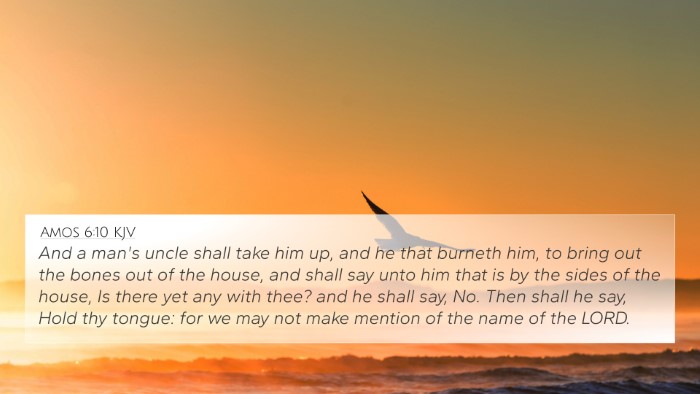
Amos 6:10 (KJV) »
And a man's uncle shall take him up, and he that burneth him, to bring out the bones out of the house, and shall say unto him that is by the sides of the house, Is there yet any with thee? and he shall say, No. Then shall he say, Hold thy tongue: for we may not make mention of the name of the LORD.
Micah 1:10 Verse Analysis and Similar Verses
Bible Verse Meaning: Micah 1:10
Verse Overview: Micah 1:10 states: "Tell it not in Gath; weep not at all: in the house of Aphrah roll thyself in the dust." This verse carries deep emotional and cultural significance, portraying a moment of mourning and lamentation for the people of Israel amidst impending judgment.
Interpretation of Micah 1:10
This verse can be understood as a warning against public displays of grief. In ancient Israel, Gath was known as a city of the Philistines, and the prophet Micah employs this reference to highlight a call for restraint in mourning. By suggesting that the people not weep in Gath, Micah underscores the importance of their nation’s honor, particularly in the face of their enemies.
Commentary Insights
Matthew Henry's Commentary
Matthew Henry notes that this verse is an admonition against celebrating Israel's misfortunes publicly. The call for silence in Gath implies that the prophet wishes to protect the dignity of Israel even when facing inevitable judgment. By rolling in dust, the true depth of grief is expressed in a non-verbal manner, acknowledging sorrow while also refraining from giving satisfaction to the enemy.
Albert Barnes' Notes
Albert Barnes emphasizes the poetic nature of Micah's words and the imagery employed. He suggests that rolling in dust signifies complete humility and recognition of sin. This verse also serves as an indication to the neighboring nations; there should not be any triumphalism in their observation of Israel's plight. Therefore, it is an expression of mourning that focuses on personal rather than public displays.
Adam Clarke's Commentary
Adam Clarke highlights the cultural implications of rolling in dust, interpreting it as a sign of extreme grief and penitence. He contextualizes the verse within Micah's broader message, pointing out that it illustrates the consequences of social and moral decay among God's people. Clarke additionally indicates that the reference to “Aphrah” relates to a town within Judah, possibly revealing the internal divisions and calamities affecting Israel.
Cross-References Related to Micah 1:10
- 2 Samuel 1:20: "Tell it not in Gath, publish it not in the streets of Askelon..."—similar exhortation regarding mourning.
- Lamentations 2:10: "The elders of the daughter of Zion sit upon the ground..."—expressing collective mourning.
- Isaiah 15:5: "My heart shall cry out for Moab..."—emphasis on deep, personal sorrow.
- Jeremiah 48:38: "There shall be lamentations generally upon all the roofs..."—further illustration of widespread grief.
- Ezekiel 27:30: "And shall make their voice heard in weeping..."—but focusing on public echo of grief.
- Amos 5:16: "Therefore the Lord, the God of hosts, the Lord, saith thus..."—call to sorrow and mourning.
- Psalms 30:5: "Weeping may endure for a night, but joy cometh in the morning."—contrast of sadness and hope.
Thematic Connections
Micah 1:10 explores several biblical themes, including:
- Judgment: Foreshadowing God's displeasure and the need for repentance.
- Mourning: Signifying the seriousness of the covenant failures and resulting consequences.
- Restoration: Invoking the hope for renewal through acknowledgment of sin.
- Public vs. Private Grief: Discussion on how to express sorrow without dishonoring one’s community.
Importance of Cross-Referencing
Engaging in cross-referencing helps deepen understanding of biblical texts, revealing the interconnectedness of themes and messages throughout the Scripture. Micah 1:10 illustrates the principle of grief within the community and serves as a caution against surrendering to despair.
Utilize tools for Bible cross-referencing such as a Bible concordance to uncover similar verses and create thematic links between the Old and New Testaments, enriching your biblical study and enhancing your sermons.
Conclusion
Micah 1:10 is not merely a historical lament but a powerful reminder for believers about how to navigate the consequences of sin, the importance of dignity in mourning, and the pervasive hope for divine restoration. Studying its implications through cross-references provides invaluable insights into the heart of God and His enduring covenant with His people.
